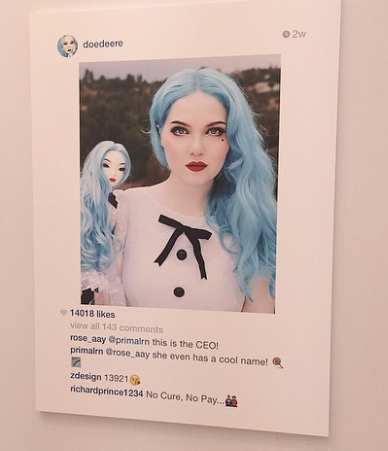Reactions to the Richard Prince Instagram story continue to filter in, and highlight the perpetual confusion between what is publicly available and what is in the public domain. They are not the same thing, with important legal consequences.
Richard Prince, Social Media and the Public Domain: Reports of Copyright’s Demise are Premature
Topics: Richard Prince, Missy, Copyright Act, Prince v. Cariou, Canal Zone, Patrick Cariou, Suicide Girls, vulture.com, Yes Rasta, 17 U.S.C. § 107, Jerry Saltz, Instagram, Copyright, transformativeness, Fair Use, ArtNet, New York Magazine, § 107
Fair Use Fool me Twice, Shame on Me—Richard Prince Goes Trolling on Instagram But May Have a More Pedestrian Problem
Few art law cases have received as much attention as that of Richard Prince and his dispute with Patrick Cariou over the latter’s Yes, Rasta photographs that Prince altered, defaced, and otherwise rearranged for his Canal Zone series. Prince has now garnered renewed attention for his appropriation of Instagram images in a set of works he has been selling at a Gagosian Gallery show called “New Portraits" (and in various other venues over the last few months). He escaped liability for infringement of Cariou’s pictures (though the case settled after remand; several infringement claims were still in play when the parties settled). Can he do so again? If this recent effort is not infringement, it certainly begs the question of whether the fair use exception has swallowed the rule. Lastly, Instagram itself may have prohibited the entire exercise in its terms of use, a possible avenue to short-circuit the entire copyright exercise.
Topics: Richard Prince, Copyright Act, DoeDeere, 2LiveCrew, Prince v. Cariou, Roy Orbison, Canal Zone, Patrick Cariou, Internet, Yes Rasta, 17 U.S.C. § 107, Instagram, Copyright, Gagosian Gallery, transformativeness, Fair Use, § 107
“Copyrights on the Street” at Copyright Society Annual Meeting June 9, 2015
I am pleased to be participating in a panel discussion in two weeks at the Copyright Society of the U.S.A.’s annual meeting in Newport, Rhode Island. The panel, entitled “Copyrights on the Street: Creating and Preserving Graffiti and Other Art in Public Spaces,” will explore:
Topics: Copyrights on the Street Creating and Preserving G, Newport, Rhode Island, Graffiti Art, Visual Artists Rights Act, Deirdre A. Fox, Copyright Society of the U.S.A., Peter Caruso, VARA, Kernochan Center for Law Media and the Arts, Phillippa Loengard, Events, 17 U.S.C. § 106A, Columbia Law School, Copyright, Christopher J. Robinson
Order Restored—Copyright Claim to Individual Performance in “Innocence of Muslims” Fails
The full en banc panel of the Ninth Circuit Court of Appeals has reversed the earlier three-judge panel decision concerning a claimed copyright in the notorious Innocence of Muslims film. The full panel rebuked—wisely—the earlier panel’s holding that Cindy Lee Garcia had an independent and enforceable copyright in her acting performance that would allow her to enjoin reproduction of the video (on YouTube, in particular). Garcia’s case failed both for threshold reasons of fixation, and larger issues of copyright and the First Amendment. The case is a sympathetic one, but the ruling that has now been overruled was an unworkable one that needed to be corrected. Many of the problems and ramifications of the earlier opinion that we have noted were echoed in the decision.
Topics: Copyright Act, Libya, Digital Millennium Copyright Act, DMCA, Youssef, YouTube, Innocence of Muslims, prior restraint, 17 U.S.C. § 106, Cindy Garcia, Copyright, First Amendment, Google, Benghazi, work for hire
California Resale Royalty Act Ruled Unconstitutional as to Out of State Sales, What Effect on the Market?
In a decision long awaited by artists and auction houses in particular, the Ninth Circuit Court of Appeals has ruled that the California Resale Royalty Act of 1976 (CRA)—America’s only droit de suite—is unconstitutional top regulate any sales of art outside of California. The court concluded, however, that that portion of the law is severable from the rest, and let the regulation of in-California sales stand for further interpretation by a subsidiary panel of the appeals court. There are two likely aftereffects of this decision. Galleries and auction houses can put any concerns to rest about sales in New York in particular, but one has to wonder about the effect it will have on putting items for sale in California, which will effectively have a premium not present in other states. It also raises the possibility that the resulting piecemeal framework will motivate movement on the pending federal bill (the American Royalties Too (ART) Act of 2015) concerning resale royalties. Could this be the development that prompts movement in Congress?
Topics: Legislation, Resale Royalties, Chuck Close, Supreme Court, Christie's, Cal. Civ. Code § 986(a), Dormant Commerce Clause, droit de suite, sales tax, Cal. Redev. Ass’n v. Matosantos, use tax, American Royalties Too (ART) Act of 2015, California Resale Royalty Act, Copyright, Ninth Circuit Court of Appeals, Sotheby's, eBay
UPDATE: Left Shark Not Free to Roam the Oceans of Intellectual Property Just Yet
UPDATE: The battle over Left Shark is not over yet! Upon closer examination, last week’s trademark-related denial involved only one of six classes (Class 41 for “live musical and dance performances”) covered in Katy Perry’s application to register a front view of the Left Shark. The Patent and Trademark Office rejected the specimen she submitted to prove use of the image as a service mark. The specimen in question was a photograph taken from the Super Bowl performance. Despite this initial rejection all of Perry's applications are still very much in play.
Topics: Left Shark, trade dress, USPTO, Halftime Show, Katy Perry, Super Bowl, Copyright, Patent and Trademark Office
Left Shark Podcast with Massachusetts Lawyers Weekly
I participated in a podcast on Friday about the denial of a portion of an application for trademark recognition to Katy Perry for the "Left Shark" phenomenon. You can listen to it here.
Topics: Left Shark, Massachusetts Lawyers Weekly, Katy Perry, Podcast, Copyright
Go Forth, Left Shark, and Prosper? USPTO Trims Katy Perry’s Request to Trademark Super Bowl Meme
In the afterglow of the spectacle of this year’s confusing yet captivating Super Bowl halftime show (Go Pats!), we mused about the art law ramifications of the unexpected birth of the visual Left Shark phenomenon, the costumed dancer who was famous within seconds for a certain lack of enthusiasm. The initial discussion focused on whether the dancer’s costume design within the show itself allowed Perry to control its use as a matter of copyright. The recipient of one cease and desist letter disagreed, both humorously and persuasively, principally based on precedents about costume designs, and on the nature of the use itself. Left unresolved were any arguments about fair use, but those seemed clear to us as well: a T-shirt, Twitter post, internet meme, SportsCenter commercial, etc., that evokes some level of post-modern world-weariness in contrast to Perry’s boisterous beach-party theme should be transformative enough even for the strictest of copyright constructionists. It is not clear on the public record though how much of a fight there has been over that point.
Topics: Left Shark, trade dress, USPTO, Halftime Show, Katy Perry, Super Bowl XLIX, New England Patriots, Sullivan & Worcester LLP, Super Bowl, Copyright, Patent and Trademark Office, Trending Trademarks
Third Time a Charm? New Resale Royalty Bill Filed in Congress
Twice in the last four years, a bill has been filed to adopt what is known as droit de suite, or resale royalty, in which an artist would be entitled under certain circumstances to a royalty on sales after the initial one. The most common justifications for these bills relate to fairness and uniformity. As to the first, many artists’ works do not become valuable until later in their careers, long after the works had been sold first. These artists, the argument goes, should share in the benefit of their increased regard. The uniformity argument has to do with droit de suite in other countries, though that is hardly a clear picture and many residents of those countries object to what they say is the effect on their local markets.
Topics: Equity for Visual Artists Act of 2011, Resale Royalties, Ed Markey, American Royalties Too Act, Chuck Close, Resale Royalty, Jerrold Nadler, Christie's, Tammy Baldwin, California Resale Royalties Act, Copyright, United States Copyright Office, Sotheby's, eBay, Art Law Report
I'm pleased to be participating next month in the Professional Artist Series at Danforth Art in Framingham, Massachusetts. The Danforth is a wonderful museum and school that engages both the creation and exhibition of art across a broad community. It is a real treasure.
Topics: Massachusetts, Danforth Museum School, Jessica Burko, The Boston Globe, Cate McQuaid, Professional Artist Series, Events, Copyright, Nicholas O'Donnell, Museums, Sullivan and Worcester LLP, Fair Use, Art Law Report, Framingham






